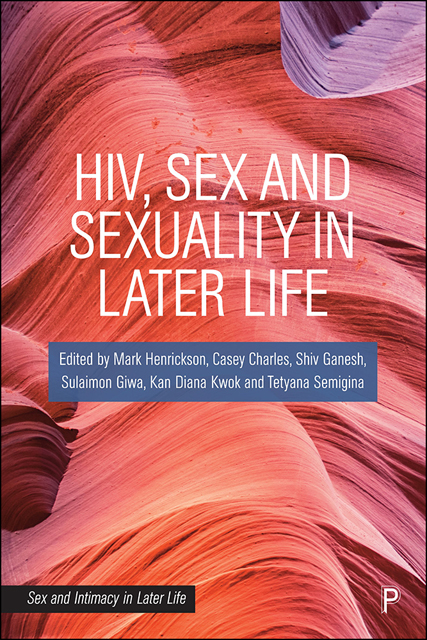Series editors’ introduction
Published online by Cambridge University Press: 16 June 2023
Summary
This Sex and Intimacy in Later Life book series will explore, interrogate and enlighten upon the sensual, sexual and intimate lives of older people. The motivation for launching this series was a concern with the relative lack of attention in public, professional and academic/intellectual spheres to sex and intimacy in later life (indicatively, Hafford-Letchfield, 2008; Simpson et al, 2018a, 2018b). The series is intended to contribute to and enrich the development of the field of studies in the intersections of age, sex, sexuality and intimacy as a critical and important area of scholarship. It is only beginning to be recognised as an important social, cultural and political issue within and beyond the ‘Western’ academy, from which it has emerged. Its earliest contributions, of which this volume are a part, are motivated by a desire to recognise and reject the pathologies and prejudices that have infused this intersection – what Simpson has termed ‘ageist erotophobia’ (Simpson et al, 2018b, p 1479) – and fuels the failure to acknowledge older people as sexual agents. This is both an intellectual and a political agenda, to question and evaluate the impact of real rather than assumed losses of cognitive, physical, social and sexual capacity, and to recuperate older people as sexual agents from dismissal, ridicule and trivialisation.
If the latter half of the twentieth century was characterised by challenges to the pathologies of social identities – particularly gender, ethnicity and race, disability, sexuality – and struggles for recognition, rights and liberties, more intersectional struggles and recognitions characterise the twenty-first century (on intersectionality, see indicatively Hancock, 2016; Hill Collins and Bilge, 2016). Significant among these has been the re-evaluation of what it is to age and to be an older agent in contemporary societies. Older people have historically experienced both veneration and respect and neglect and pathology, largely based on differing cultural stereotypes of the value of age (Ylanne, 2012). The most common characterisation is that older people are not sexual, past being sexual or represent a problematic sexuality – or their sexuality is a superficial concern and secondary to concerns of health, care, life course and support by public services and engagement and pensions/resources.
- Type
- Chapter
- Information
- HIV, Sex and Sexuality in Later Life , pp. xi - xxPublisher: Bristol University PressPrint publication year: 2022

